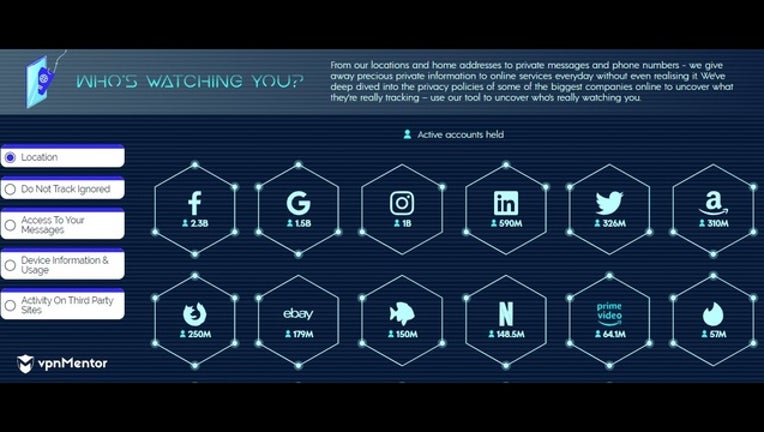Interactive tool shows what tech giants know about you

An interactive tool from VPNmentor digs into the privacy policies to tell you what you are relinquishing. Image: VPNmentor.
San Jose, Calif. (KTVU) - If you’ve never bothered to read the privacy policies of all the free apps and services that everyone considers essential, here’s a handy tool that digs into the specifics of what you’ve parted with.
VpnMentor, a website that reviews VPN services and web privacy tools recently launched Who’s watching you, an interactive tool that digs into the privacy policies of 21 popular internet services and platforms like Google, Facebook, Amazon to tell you exactly what you’ve relinquished. Here’s what they found.
18 of the 21 services tracked your location at all times when using the app. Facebook and Instagram both not only track your location but also the location of businesses and people nearby, as well as saving your home address and your most commonly visited locations. Some services, like Tinder, continue to track this even when the app is not in use. This data can be used in unforeseen ways - a recent report by New York Times investigated how police forces use Google's location history database to find witnesses and suspects near crime scenes.
Your DMs are not private. Facebook, LinkedIn and Instagram use the information you share on their messaging services to learn more about you. Twitter and Spotify both openly state they have access to any messages you send on their platforms.
Many services and apps track more of your device information than is appears to be needed. Facebook and Instagram, for example, both track your battery level, signal strength, nearby Wi-Fi spots and phone masts, app and file names on your device and more. Meanwhile, Google and Amazon both keep hold of voice recordings from searches and Alexa respectively. Apple Music tracks phone calls made and emails sent and received on the devices the service is used on, though this information is not available to staff, the tool reports.
Even if you don’t hold an account with these services this won’t stop your online moves being tracked. Google keeps track of your activity on third party sites that use Google features like adverts, while Facebook partners (an enormous 8.4 million sites across the web) send both them and Instagram data collected through Facebook Business Tools like the Like button – regardless of whether or not you have a Facebook account or are logged in.
The “Do Not Track” option offered by some browsers is largely ineffectual. Almost no major sites respond to the signal given, instead continuing to track you regardless.
Facebook also holds any data provided about you from others – including if they upload your contact information without your permission.
Dating sites within the Match.com umbrella (Match.com, Tinder, OKCupid and Plentyoffish) all share any data shared with one service with all of the others.
“The amount of data held online about users should make them wary about how their personal details are used,” said Gaya Polat, Internet security expert at VPNmentor in an emailed statement. “While the majority of this data usage is benign or necessary for services to function, knowing which companies hold which data about you is the only way to track your privacy, and how secure you really are,” he added.

